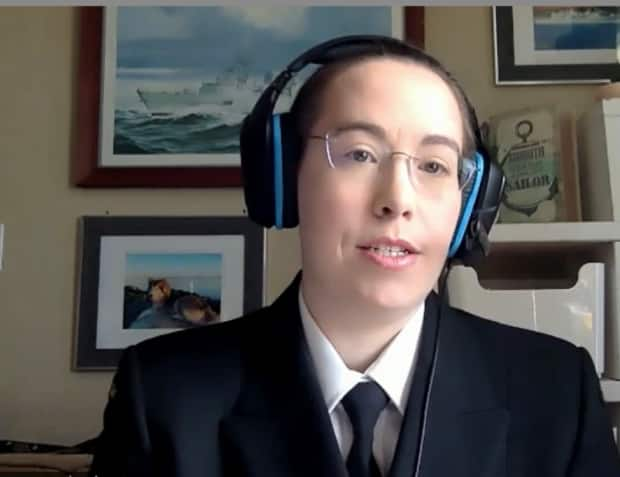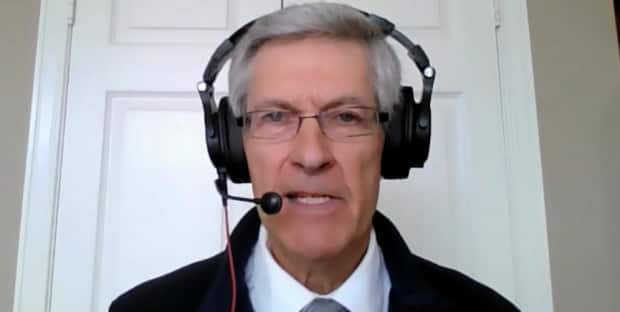MPs hear harrowing account of sexual assault in the military

A House of Commons committee heard startling testimony about rape and retribution from different witnesses today as it continued its examination of sexual misconduct in the military.
The status of women committee heard both from complainants and from former senior military officer Bernie Boland — who alleges he stood up against the harassment of a female colleague and faced a deliberate, Department of National Defence-backed smear campaign as a result.
Aviator Emily Tulloch, an air force technician, told MPs her military career has been one horrifying event after another.
"I joined the Canadian Armed Forces in July 2018, and since then, I feel like I have experienced a lifetime worth of sexual assault and misconduct," she said.
"I am here today to tell you that I was raped only one month into my basic training at St. Jean (Que.). One month. I was also sexually assaulted during my training at Borden (Ont.). And I have been groped and kissed unwillingly at group parties and mess events. These degrading behaviours are more common than you think."
'Treated like a criminal'
Tulloch said her encounters with the military justice system have been "quite negative."
She said she was interviewed three times by military police after reporting misconduct. Two of those interviews, she said, were "dreadful" experiences.
"It felt more like an interrogation," she said.
"During these interviews I felt investigators were not treating me like a human being, but as just another case file to them. There was no empathy and humanity, and it was so frustrating that during the second interview I left early because I felt like I wasn't being heard, and that I was being treated like a criminal."
Tulloch said military police training related to sexual assault survivors must be improved.
Dawn McIlmoyle, a former member of the military whose report of being raped by a colleague made national headlines in the late 1990s, told MPs she faced discipline herself over the incident involving her attacker — and was at one point made to stand alongside him during disciplinary proceedings.
The system, she said, left her feeling abandoned, broken and at fault.
"When I left the military, I had no self-respect, no self worth and no self value," McIImoyle said.

Lt. (N) Heather Macdonald, a naval combat systems engineer, told MPs that getting justice for a sexual assault in the military is even harder than it is in the civilian justice system.
"Getting justice for incidents of sexual assault is generally very difficult for the average female in our Canadian society," said Macdonald, whose allegation is at the centre of a sexual misconduct investigation involving Chief of the Defence Staff Admiral Art McDonald.
"It becomes more difficult when you are trying to get justice through the military, under the National Defence Act (NDA) where there are more options to plead down to an NDA offence, which carries little consequences for the perpetrator.
"And it becomes more difficult if you are in the navy and the incident happens on a navy ship at sea or in a foreign port."
When Canadian warships are abroad, Macdonald said, there are no military police officers who serve on those ships. When an incident happens, investigations are often carried out by the ship's coxswain and section chiefs, who conduct disciplinary inquiries.
"This greatly reduces the chances that admissible evidence will be gathered and preserved," she said.
The committee steered clear of the specifics of the assaults involving all three women; chair Marilyn Gladu noted that some of the cases "remain under investigation by military police."
Former officer says he was targeted for payback
Testifying before a parliamentary committee does grant military witnesses a certain freedom to speak in public they might not otherwise enjoy.
Boland, a retired lieutenant-colonel, told MPs that while he worked at DND headquarters in Ottawa, he was singled out for retribution after reporting the harassment of a junior female colleague by a senior engineering manager.

Boland alleged his female colleague filed a human rights complaint and DND, in its response, blamed him for the harassment.
"I reported it. He was promoted. We faced reprisal and retaliation," Boland told the four-party committee.
"DND, in a formal departmental submission to the Canadian Human Rights Commission, secretly made me the scapegoat for the misconduct. I was made aware of these surreptitious actions by the woman who was harassed. DND secretly making me the scapegoat was reprehensible and I vehemently protested."
In a formal complaint filed last January, Boland wrote to Defence Minister Harjit Sajjan and singled out the department's deputy minister for allowing the submission to go to the human rights commission.
He said his colleague's complaint was "summarily dismissed" by the department, despite Sajjan's public claim that all allegations will be thoroughly investigated, no matter the rank or position of the individuals involved.
Boland filed a series of documents with the committee to support his allegations.
"There is a cultural problem in defence," he said, "but there is institutional reluctance to distinguish between the proximate and the ultimate cause of this problem.
"From my perspective, the ultimate cause is the failure and breakdown of leadership to act in an ethical, morally-appropriate, determined and deliberate manner to arrest and eliminate misconduct."
Macdonald offered a similar warning, telling MPs that the future of the Canadian military is at stake.
"I worry that if nothing comes from this issue, which has so much heat and light, that we will lose hope," she said.
"People in uniform will lose hope that any other issue can be fixed, and that could trigger more people leaving uniform than what our organization can handle."

